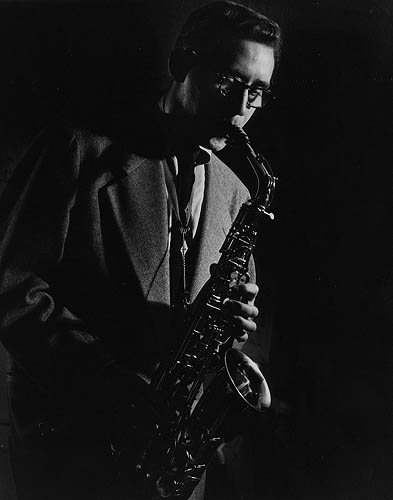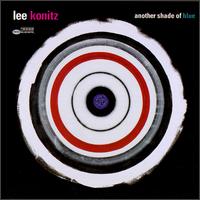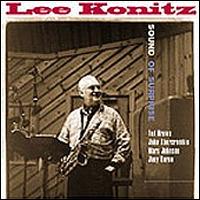

Courtesy of Lee Konitz

Blue Note

RCA Victor
A FIRESIDE
CHAT WITH LEE KONITZ
While
recovering from surgery, Lee Konitz was gracious enough to honor his commitment
to the Roadshow. Credited with
catapulting a "cooler" sound on the alto saxophone (whatever that means),
Konitz has largely solidified his place among the jazz elite with his
collaborations with Lennie Tristano and Warne Marsh. But it is his work
away from Marsh and Tristano that has intrigued me the most. His latest
live recording on Blue Note from Los Angeles' own Jazz Bakery, his recent
release on RCA Victor, and his new release on Palmetto are all required
listenings. I bring to you one of the finest altoists of our time, unedited
and in his own words.
FRED
JUNG: Let's start from the beginning.
LEE
KONITZ: I listened to the radio secretly and there were many big bands
at that time, in the Forties, playing at ballrooms and hotels and that
was my first real excitement of this music. As a result of hearing Benny
Goodman, I asked my parents for a clarinet and proceeded from there to
get familiar with the music.
FJ:
What prompted you put down the clarinet for the saxophone?
LEE
KONITZ: I quickly learned that if I wanted to work, I would have to play
the saxophone. The clarinet was just what they call a doubling instrument.
So the next year, I was given a saxophone from my parents. From then on,
I started to work early on. I quickly, due to the war years, was able
to work a lot. It was very promising for me.
FJ:
Charlie Parker cast a long shadow.
LEE
KONITZ: I think all of the instruments and arrangers putting ensembles
together were using that vocabulary basically. Tristano, we were aware
and studying that music, learning the solos and all of the things that
you do to find out how a great solo feels. Tristano had ideas of extending
the harmonies and the rhythmic permutations. That was very intriguing
at the time and kept me from really getting very involved, as everyone
else was, with Charlie Parker's influence.
FJ:
Let's touch on your collaborations with Lennie Tristano.
LEE
KONITZ: We met in Chicago. I was working with a dance band across the
street from a club where a friend of mine was playing piano. I went over
afterwards to see him and hear him and Lennie was playing in the alternate
band with some Mexican musicians playing Latin music and they sounded
fascinating the way he was playing. I met him and we talked and I found
out that he was teaching and I wanted to learn and so that started that
way. At that time, I hadn't played with that many piano players. He had
a very unique way of playing very long lines. It was always very stimulating
to hear him and to play along with him. He kind of really nudged you along
so to speak. I always appreciated a friendly nudge.
FJ:
And your partnership with Warne Marsh?
LEE
KONITZ: Well, we were studying simultaneously and Lennie asked us to be
part of his band and so we got the opportunity to play together in that
context. That was really the only context that we played together at that
time, pretty much. I did make a record with just Warne and not Lennie,
but as far as working, it was just under Lennie's basic influence.
FJ:
You played on Miles Davis' significant Birth of the Cool recording.
LEE
KONITZ: That was a result of Claude Thornhill situation. Gil Evans was
also a part of and Gerry Mulligan. Miles was kind of listening to that
band and they were talking about making a little band with that kind of
a sound, with the French horn and the tuba. We didn't know the consequences
of it. I didn't have thoughts about the future or acceptance of it or
significance of it. I always thought that what Tristano was doing was
kind of special and I had to be careful not to get into an ivory tower
over that and thinking that we were better than somebody else. I, out
of that school, was really the only one that went out and worked. I had
a family and I was playing in different situations. They were, a lot of
them were students of the music, more or less, working days and just trying
to maintain their aesthetic.
FJ:
That was such a fertile period.
LEE
KONITZ: It was a very active period. It was very stimulating. It seemed
like it was always going to be like that and get better. Those of us involved
in this particular music were very intensely learning about the music
and we had opportunities occasionally to record. There is always an element
of mystery in this music, the way I approach it especially.
FJ:
Dividing your time between both sides of the Atlantic, what is it about
the climate towards jazz in Europe that continues to call you?
LEE
KONITZ: I was going to Europe starting in the Fifties because there was
an opportunity to play. It is like, why does a dog lick itself. It is
celebrated there. There was a big perspective and they were really interested
in seeing what made it tick and so we were treated very specially and
still. People like me. I am still doing the bulk of the playing over there
and we are still treated as foreign dignitaries on that level.
FJ:
Let's touch on your two Blue Note records, Alone Together and Another
Shade of Blue, that paired you with Charlie Haden and Brad Mehldau.
LEE
KONITZ: That was two nights of recording and sixteen tunes or so came
out of it and we chose six tunes or so for the first record and they were
well received and so maybe a year later, they expressed an interest in
the rest of the material. I said that this was kind of rejected material.
There were five tunes left and three of them were ballads. They said that
they were interested and so most of the material was released. I had worked
with Charlie before, but it was the first time with Brad.
FJ:
Any thoughts of revisiting that trio.
LEE
KONITZ: Oh, I don't know. I actually heard Brad play last night, here
in town and I liked his playing a lot. But his trio playing is really
where he's at. He is a very sensitive man and he adjusted to me and I
always appreciated that. I tried to adjust to him also. That is kind of
the name of the game. I don't think that there will be an occasion to
play again, but I hope there is.
FJ:
And your latest on RCA Victor.
LEE
KONITZ: That was put together by a man from Paris, who used to have Owl
Records, whom I have recorded for before. He was doing some A&R work for
BMG and he suggested the quartet and I suggest Ted, who I had started
to do some things with. It was really a nice experience and I decided
that with my wife's encouragement, to do all my tunes. So I did some of
the old ones and wrote some new ones. When I came to the States, I went
to Tower Records and I noticed that they had put a sticker on the front
of the records saying that this was the first record of all Lee Konitz
tunes and I said, "Wow." And I wanted to buy one immediately (laughing).
FJ:
Any tour dates on the mainland?
LEE
KONITZ: I was just practicing before you called, Fred. I am just recuperating
from surgery and starting in September, I am working in Chicago for a
week, in New York for a week. I was supposed to come to Los Angeles on
September 30, but I thought it was a little bit too much, just starting
out after not playing for three months. I am just getting back to playing
after three months and so I have to kind of learn all over again. I would
have been traveling to Los Angeles to do a special concert. I really didn't
want to go because I would have had to come back to Cologne, where I live
when I am not in New York and it seemed like a little much.
FJ:
Cologne must give you solace.
LEE
KONITZ: It is a very nice, contemporary city. I get motorcycles coming
under my apartment and radios and all the stuff that young hippies make
noise with. Yeah, it is pretty peaceful there.
FJ:
And the future?
LEE
KONITZ: Well, I have a number of records that have been recorded already
that are trickling out slowly. One that I am very pleased with that I
did for John Zorn's label (Tzadik) with a trio, all new pieces by me.
The next day, I went into the hospital and almost died. It was an interesting
procedure. So that is coming out eventually. I made a record with a string
quartet of French impressionist composers. That will be on the Palmetto
label.
FJ:
Was surgical procedure was performed?
LEE
KONITZ: It was two heart operations. I am almost fully recovered now.
One of the other records, incidentally, that has just been released on
Enja with a quartet, I found out that the name of that record is Open
Hearts.
FJ:
So you are well on your way and I wish you a speedy recovery.
LEE
KONITZ: That is a fact, Fred. Thank you for the thought.
Fred
Jung is Jazz Weekly's Editor-In-Chief and in sudden death overtime. Comments?
Email
Fred.